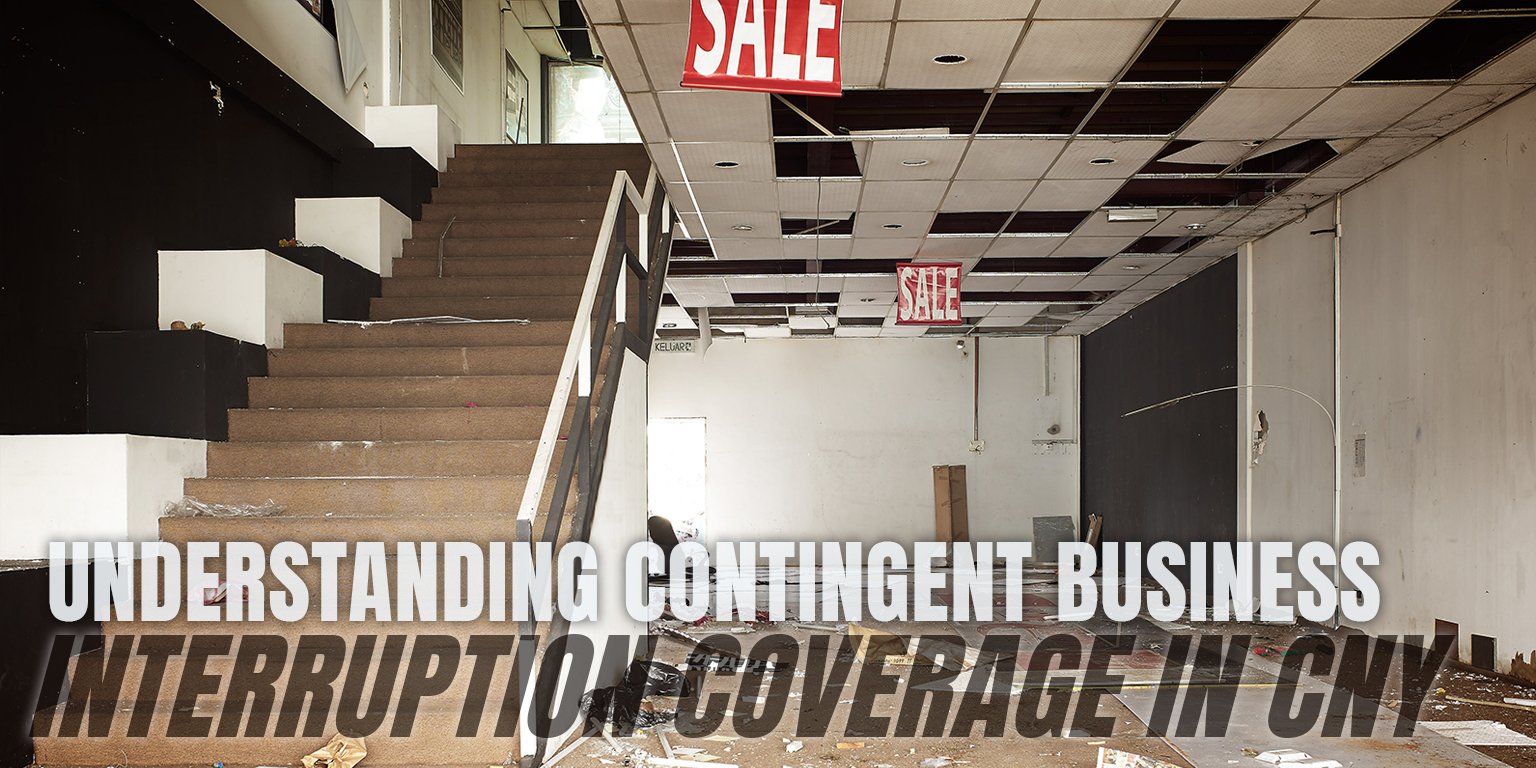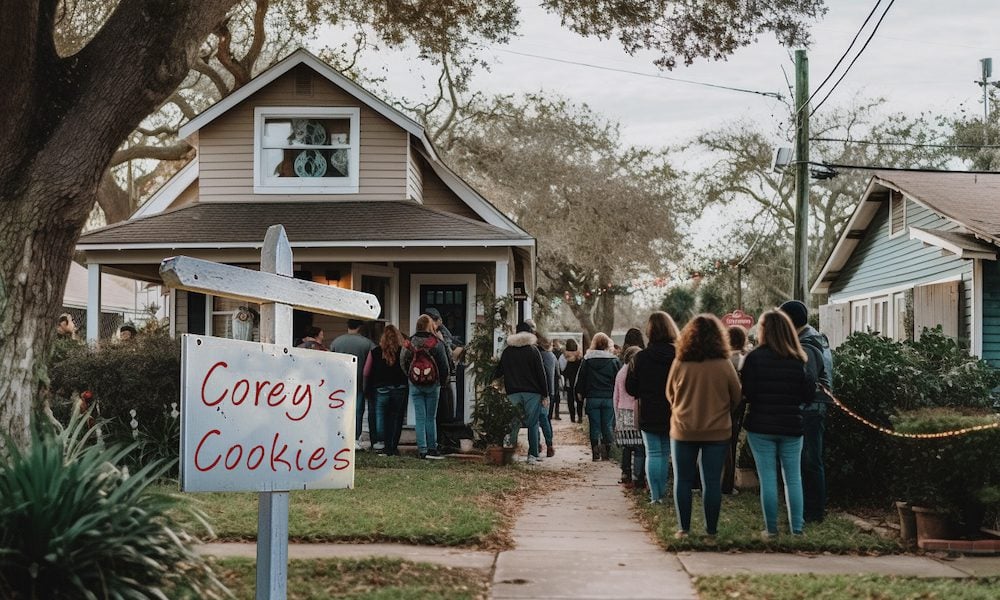Understanding Contingent Business Interruption Coverage When Other Central New York Businesses Face Unexpected Closures
August 4th, 2025
4 min read

Running a business in Central New York means understanding that your success often depends on other businesses around you. When the flagship store in your shopping plaza shuts down due to a fire, or your key supplier can't deliver products after storm damage, your revenue can disappear overnight.
Most business owners know about regular business interruption coverage, but many don't realize there's coverage designed specifically for losses caused by someone else's misfortune.
At the Horan insurance agency, we help Central New York business owners explore coverage options that address the interconnected nature of modern commerce. We work with multiple carriers to help you understand how contingent business interruption coverage might fit your unique business situation.
In this article, we'll examine what contingent business interruption coverage includes, explore real-world scenarios where it applies, and discuss how this specialized coverage could help address income losses when other businesses you depend on face unexpected closures.
Understanding How Contingent Business Interruption Coverage Functions
Contingent business interruption coverage represents a specialized form of coverage found within business owner's policies. This coverage addresses income losses your business experiences when another business you depend on suffers a covered loss that interrupts their operations.
Unlike standard business interruption coverage that responds to direct damage to your own property, contingent coverage activates when external businesses critical to your operations face temporary shutdowns. The coverage compensates you for lost income up to specified limits when these dependency relationships get disrupted.
This coverage typically requires that the other business suffers a covered loss—such as
- fire,
- wind damage, or
- other perils listed in your policy.
The loss must directly impact your ability to generate revenue, either through reduced customer traffic or inability to obtain necessary products or services.
For example, if you operate a restaurant in Armory Square and depend on a specific food distributor, contingent coverage could help if that distributor's warehouse burns down and they can't deliver ingredients for several weeks. Your policy would help compensate for the income loss during the period you can't operate normally.
Real-World Scenarios Where Contingent Business Interruption Coverage Applies
Central New York businesses face various dependency relationships that could trigger contingent coverage claims. Consider these common situations:
Anchor Store Dependencies: Small retailers in shopping centers often depend heavily on anchor stores to drive customer traffic. When a major department store in Destiny USA closes temporarily due to structural damage, smaller retailers in that area might see significant drops in foot traffic. Contingent coverage could help compensate for this lost income during the anchor store's closure.
Supplier Relationships: Manufacturing businesses throughout the Syracuse area often rely on specific suppliers for critical components. If your business in Auburn depends on a supplier in Rochester for key materials, and that supplier's facility suffers wind damage that halts production for two months, contingent coverage could help offset your lost income during this period.
Service Provider Dependencies: Professional services firms might depend on specific vendors or contractors. A marketing agency in Baldwinsville that relies on a particular printing company for client materials could face income losses if that printer's equipment gets damaged and they can't fulfill orders for several weeks.
The coverage typically requires that you have a direct dependency relationship with the affected business. You can't claim coverage simply because a business in your area suffers a loss—there must be a clear connection between their closure and your income loss.
Evaluating Coverage Limits and Dependency Relationships
Most contingent business interruption coverage comes with lower limits than standard business interruption coverage. While your main business interruption coverage might provide substantial limits, contingent coverage often starts with more modest amounts that can be increased based on your specific needs and carrier options.
When evaluating this coverage, consider mapping out your key dependency relationships. Document which businesses your operations rely on most heavily, whether they're suppliers, customer-driving anchor stores, or service providers. This analysis helps determine appropriate coverage limits and ensures you understand which dependencies the coverage addresses.
Some policies allow you to schedule specific businesses or types of businesses that you depend on. This approach can provide more comprehensive coverage for your most critical relationships while potentially offering higher limits for those specifically named dependencies.
The waiting period for contingent coverage often differs from standard business interruption coverage. While your main coverage might have a shorter waiting period, contingent coverage could require a longer period before benefits begin, reflecting the indirect nature of these losses.
How to Determine if Your Business Needs This Specialized Coverage
Contingent business interruption coverage makes sense for businesses with significant dependency relationships that could impact revenue. Retail businesses in shopping centers, manufacturers with sole-source suppliers, and service businesses that rely on specific vendors often benefit from this coverage.
Consider your business's vulnerability to external disruptions. If a single supplier's closure would halt your operations, or if your customer traffic depends heavily on nearby businesses, contingent coverage deserves consideration. Businesses in Central New York's interconnected commercial areas, from downtown Syracuse to suburban shopping centers, often have these types of dependencies.
The coverage becomes particularly valuable when standard business interruption coverage wouldn't apply. If your property remains undamaged but you can't generate income due to someone else's loss, contingent coverage could provide the financial support you need to maintain operations during the disruption.
Evaluate the cost of this coverage against your potential exposure. While contingent coverage adds to your premium, the protection it offers against income losses from external disruptions might justify the expense, especially if your business operates in environments where such dependencies are common.
Securing Appropriate Contingent Business Interruption Coverage
When disruptions to other businesses threaten your income, having appropriate coverage in place can help maintain your financial stability. Contingent business interruption coverage offers a layer of coverage that addresses the interconnected nature of modern business relationships.
We covered how this specialized coverage responds to losses at businesses you depend on, examined common scenarios where it applies in Central New York, and discussed factors to consider when evaluating your coverage needs. Understanding these dependency relationships and their potential impact on your operations helps you make informed decisions about this coverage.
The Horan insurance agency provides information to Central New York business owners about various coverage options, including contingent business interruption coverage. We can discuss how this coverage might address your specific dependency relationships and share insights about coverage limits and options from different carriers.
Click the Get a Quote button below to learn more about contingent business interruption coverage and how it might help address your business's unique dependency risks.
Daniel is an accomplished content creator. He has been working in publishing for almost two decades. Horan Companies hired Daniel as its content manager in November 2022. The agency entrusted its messaging to him. Since then, Daniel has written insurance articles, service pages, PDF guides, and more. All in an effort to educate CNY readers. He's helping them understand the world of insurance so they can make informed decisions.
Topics:




























